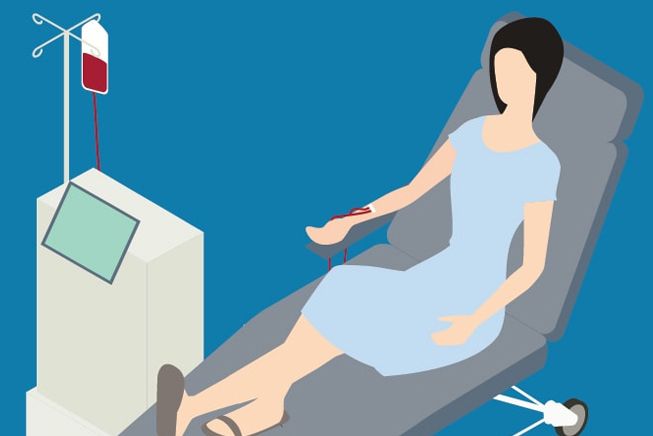
Kidney disease can be like a heavy thing that sneaks up on your life and sucks the energy out. The concept of dialysis, tubes, machines, and routine appointments can be overwhelming. But what if there’s a different approach? Ayurveda, a traditional Indian approach to healing, is an all-natural system that emphasizes a holistic approach to keep your kidneys healthy and potentially prevent or slow the progression of kidney disease. In this blog, I will tell you about how kidney failure treatment without dialysis in India is possible with Ayurveda, giving you easy tips and practical insights. Let’s dive in.
Think of them as the body’s forgotten heroes; they filter waste, balance fluids, and keep your system in check. If they begin to falter due to diabetes, high blood pressure, or other reasons, it’s a signal that the body’s balance is off. According to Ayurveda, often when the kidneys are involved, there is a Vata, Pitta, or Kapha dosha imbalance in the physiology. The toxins (known as ama) can accumulate, clogging up the channels and burdening the kidneys.
Whereas modern medicine often takes a whack-a-mole approach, treating symptoms rather than attacking the root cause, kidney failure treatment without dialysis addresses the root cause: your diet, how much activity you get, your stress level and how emotionally healthy you are. The goal? Rebalance, cleanse, and fortify the body and kidneys, naturally. Though not a substitute for medical treatment, Ayurveda can be used alongside conventional care, and in some cases may lessen dependence on invasive procedures, such as dialysis.
To a certain extent, however, it all depends on the overall health of your kidneys. Ayurveda’s approach is gentle but powerful, emphasizing prevention and healing through natural means. Here are the core principles to support kidney function:
Kidney failure treatment without dialysis in India revolves around cleansing the kidneys for better functioning. Toxins are a major culprit in kidney disease. Ayurveda recommends gentle detoxification to clear ama without overwhelming the body. Think warm, nourishing foods and herbal teas rather than harsh cleanses. Sip on Cumin-Coriander-Fennel (CCF) tea throughout the day; it’s a simple blend that supports digestion and flushes toxins. Boil 1 teaspoon each of cumin, coriander, and fennel seeds in 4 cups of water for 10 minutes, strain, and drink warm.
Your unique constitution (or Prakriti) determines how kidney disease manifests. For example:
A kidney failure treatment without dialysis in India works by assessing your dosha and tailoring a plan, but a general rule is to eat fresh, whole foods and avoid processed junk.
In Ayurveda, weak digestion (agni) is the root of many diseases. When digestion is sluggish, toxins build up and stress the kidneys. Stick to warm, cooked meals that are easy to digest; think kitchari (a rice and lentil dish) or steamed veggies with mild spices like turmeric and cumin. Avoid heavy, oily foods or eating late at night.
Ayurveda uses herbs, diet, and lifestyle tweaks to nourish the kidneys. Always consult an Ayurvedic practitioner or your doctor before starting new remedies, especially if you’re on medication.
Ayurveda has a treasure trove of herbs known for their kidney-protective properties:
These herbs are powerful but should be used under guidance to avoid interactions or overuse.
Your plate is your medicine. Ayurveda recommends:
Proper hydration is crucial, but chugging ice-cold water can shock your system. Ayurveda suggests sipping warm or room-temperature water infused with herbs like coriander or mint. Aim for 8–10 cups daily, adjusting based on your body’s needs and your doctor’s advice.
Ayurveda isn’t just about what you eat; it’s about how you live. Here are lifestyle tweaks to support your kidneys:
Chronic stress spikes cortisol, which can harm kidney function. Try Pranayama (breathing exercises) like Nadi Shodhana (alternate nostril breathing) for 5–10 minutes daily to calm your mind. Meditation or gentle yoga, like Child’s Pose or Cat-Cow, can also work wonders.
Your body repairs itself during sleep, including your kidneys. Aim for 7–8 hours of restful sleep by creating a calming bedtime routine: dim lights, avoid screens, and maybe sip some chamomile tea.
Exercise doesn’t mean hitting the gym hard. A 20–30-minute walk in nature or gentle stretching improves circulation and reduces stress on the kidneys. Avoid overexertion, which can tax your system.
Ayurveda is a powerful tool, but it’s not a one-size-fits-all cure. Kidney disease is serious, and stopping progression without dialysis requires close monitoring. Always work with your doctor and an experienced Ayurvedic practitioner to create a safe, personalized plan. If you’re already on dialysis, don’t stop without medical guidance; Ayurveda can still support you, but it’s not a substitute for life-saving treatment.
I’ve heard inspiring stories of people using Ayurveda to improve their kidney health. One woman, diagnosed with early-stage kidney disease, worked with Karma Ayurveda to overhaul her diet and start a daily yoga practice. Over months, her creatinine levels dropped, and she felt more energy than she had in years. Karma Ayurveda treats kidney failure without dialysis. While everyone’s journey is different, these stories remind us that the body has an incredible capacity to heal when given the right tools.
Conclusion
Kidney disease doesn’t have to define you. To stop kidney disease without dialysis, you need to catch the culprits early and treat them well. With Ayurveda’s wisdom, you can take charge of your health, nourish your body, and find hope in a natural path. Here’s to stronger kidneys and a vibrant you!

Certificate no- AH-2023-0186
JAN 05,2023-JAN 04,2026
"Ayurveda is not just a system of medicine; it's a way of life. Connect with us to embrace a lifestyle that nurtures your body, mind, and soul."
Book Consultation Now